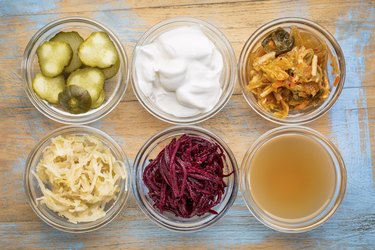
Your gut microbiome is a complex ecosystem made up of billions of microorganisms. When your good intestinal flora are flourishing, all is groovy with your gut (and your overall health). But when you have gut problems, like an overgrowth of disease-promoting microbes, some weird things can happen — and we're not just talking about bloating, gas and constipation.
Here, we spotlight seven of the most surprising results of a microbiome that's off-kilter, plus a few tips on how to get your gut back on track.
Video of the Day
Video of the Day
1. Auto-Brewery Syndrome
Probably the strangest thing that can occur when your gut is out of whack? It can brew beer.
An August 2019 case report in BMJ Open Gastroenterology highlights the diagnosis of a patient who became drunk off his own gut juices thanks to a rare condition called gut fermentation syndrome. Otherwise known as auto-brewery syndrome, this disorder is caused by endogenous gut microbiota that ferment carbohydrates into ethanol, says Lee Ann Chen, MD, a gastroenterologist at NYU Langone Health, who goes on to explain that "affected individuals become drunk despite not actually ingesting any alcohol."
The authors of the BMJ report noted that the patient had just taken a long course of antibiotics, which they believe altered his microbiome, allowing fungal yeast to form in his gut. Treatment included a short-term no-carb diet and probiotics.
Read more: 5 Probiotic-Rich Recipes Your Gut Will Love
2. Bad Breath
When it comes to bad breath, you probably attribute certain foods (onions and garlic, we're looking at you) or poor oral health to the problem. But just like bacteria can linger on your tongue and produce stinky breath, other types of menacing microbes found in your gut can lead to unpleasant mouth odors too.
Case in point: Helicobacter pylori. The most frequent cause of gastritis, this bacterium has been linked to halitosis (chronic bad breath), according to research published in the March 2015 issue of the Journal of Dentistry of Tehran University of Medical Sciences. Other symptoms of an H. pylori infection include an ache or burning in the abdomen, frequent burping and unintentional weight loss, according to the Mayo Clinic.
3. Sugar Cravings
Have a relentless sweet tooth? Gut problems may be to blame.
If you have an imbalance in your gut flora, you may be harboring too many harmful microbes. The problem? Some of these pesky yeast or fungi depend on sugar to survive. And here's the kicker: To get the sugar they need, they'll stimulate your cravings for sweets. In fact, they can even steer you toward certain foods by making them seem tastier, according to an October 2014 study in BioEssays.

4. Insomnia
Trouble catching zzzs? Your gut problems may be contributing to your sleep issues. That's because your microbiome is related to your circadian rhythms or the internal clock that regulates your sleep, according to a September 2017 study in Science.
What's more, stress — one of the main causes of sleep disturbance — may also mess with your gut microbes and lead to inflammation. And when that happens, your circadian rhythms could get thrown out of whack, and you might experience a lack of shuteye.
Conversely, when your gut is all good, you're more likely to sleep soundly. Indeed, an October 2017 study in Sleep Medicine found a positive correlation between sleep quality and higher levels of beneficial gut microbes.
Read more: 9 Surprising Ways Sleep Affects Your Whole Body
5. A Dip in Mental Health
What's happening in your gut directly affects what's going on in your head — literally. The gut-brain axis refers to this interaction between your microbiome and your nervous system.
So, if you're feeling blue, your gut may have something to do with it. Research shows that changes in your gut flora can induce feelings of anxiety or depression, according to a September 2017 review in Clinics and Practice.
6. A Dampened Immune System
The healthy bacteria in your gut can help keep your immune system in tip-top shape and protect you from foreign invaders. But when the balance is off in your microbiome, your body may be more vulnerable to disease — and not just gastrointestinal illnesses.
"Clinical and pre-clinical (i.e. animal) studies suggest that the gut microbiome plays a critical role in the normal development of the immune system, which impacts susceptibility to a wide range of diseases," says Dr. Chen.
As a matter of fact, preliminary research shows that the presence of certain strains of gut bacteria may help prevent heart disease and some cancers, according to Harvard Health Publishing.
7. Skin Issues
When it comes to healthy, glowing skin, beauty isn't skin deep. Indeed, it goes way deeper, down to your gut. In a balanced state, your gut helps stave off infection and disease. But when it's not functioning optimally, your skin may be the first place to show the signs.
Though much is still unknown about the complex relationship between the gut and skin, preliminary findings suggest that an imbalance of gut bacteria can activate the body's inflammatory response, which may trigger psoriasis, eczema and acne and that probiotics and prebiotics — which can increase the diversity of your intestinal flora — may improve skin conditions like atopic dermatitis and eczema, according to a November 2017 review in the World Journal of Dermatology.

How to Send Gut Problems Packing
There are a few things you can do to help prevent a gut imbalance and boost your body's good bacteria:
- Avoid unnecessary antibiotics that can deplete good gut bacteria, says Dr. Chen. In other words, make sure you're only taking antibiotics when you truly need them. But if and when you do need these drugs, consider taking a probiotic supplement after your course is through. According to the Mayo Clinic Health System, some research suggests probiotics can boost the immune system, reduce inflammation and prevent or treat diarrhea caused by antibiotics.
- Follow a healthy, varied diet that encourages a diverse ecosystem in your gut, says Dr. Chen. Prebiotics, or the plant fibers found in many fruits and vegetables, can help stimulate the growth of good bacteria in the gut, according to the Mayo Clinic.
- Incorporate more fermented foods into your diet that contain probiotics (live bacteria). Examples include sauerkraut, kimchi, yogurt and kefir, according to Harvard Health Publishing.
- Journal of Dentistry of Tehran University of Medical Sciences: “Relationship of Halitosis with Gastric Helicobacter Pylori Infection.”
- BioEssays: “Is eating behavior manipulated by the gastrointestinal microbiota? Evolutionary pressures and potential mechanisms.”
- Sleep Medicine: “A preliminary examination of gut microbiota, sleep, and cognitive flexibility in healthy older adults.”
- Harvard Health Publishing: “Can gut bacteria improve your health?”
- BMJ Open Gastroenterology: “Case report and literature review of auto-brewery syndrome: probably an underdiagnosed medical condition.”
- World Journal of Dermatology: “Skin-gut axis: The relationship between intestinal bacteria and skin health.”
- Mayo Clinic: "Helicobacter pylori (H. pylori) infection"
- Mayo Clinic Health System: "An introduction to probiotics"
- Mayo Clinic: "Prebiotics, probiotics and your health"
- Science: "The Intestinal Microbiota Regulates Body Composition Through NFIL 3 and the Circadian Clock"
- Clinics and Practice: "Gut microbiota’s effect on mental health: The gut-brain axis"
Is this an emergency? If you are experiencing serious medical symptoms, please see the National Library of Medicine’s list of signs you need emergency medical attention or call 911.